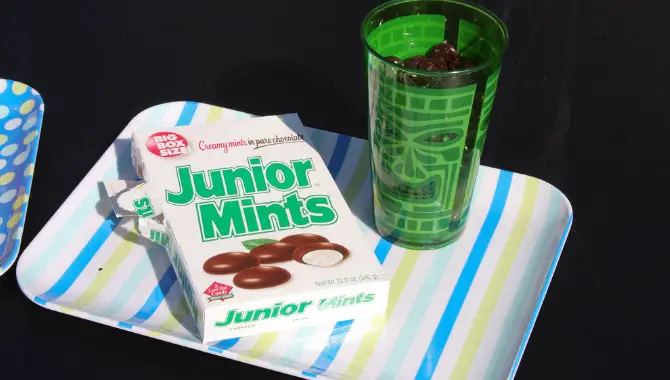Today we’re going to look at the vegan status of a popular candy treat: junior mints. These are Tootsie’s small rounds of mint fondant covered in a dark chocolate coating. They have been around for quite some time and their delicious taste makes you wonder what they are made of. If you’re vegan, you’re probably already used to taking time to check ingredient labels before buying any food product. This is to ensure you’re not consuming anything that goes against your beliefs. There’s an increasing number of food products labelled as vegan-friendly; unfortunately, some of them contain ingredients that may not sit well with vegans.
Are Junior Mints vegan? Technically, no! While there are no obvious animal products in junior mints, they contain confectioner’s glaze. This ingredient is made with shellac, which is a resin secreted by female lac bugs. As you can see, this defies the whole purpose of veganism, which is to avoid products that contain animal products or by-products. It also contains one or two controversial ingredients that I’ll talk about later.
Many vegans make an effort to eat a healthy diet overall, but it doesn’t mean we can’t indulge our sweet tooth occasionally. A vegan diet is not as limited as many would think. Many popular candies are acceptable in the vegan world. An animal cruelty-free diet can be tasty too, especially with the growing trend of vegan junk food. However, before you get a taste of whatever candies your tooth desires, always double-check the ingredient list to ensure everything is in line with your food ethics. Even though most types of candies contain no visible animal product, some contain controversial ingredients that may be of vegan concern. Here’s everything there is to know about junior mints so you can decide whether or not to include it in your vegan diet.
Are Junior Mints Vegan
To help answer this question, let’s first take a look at the ingredients used to make junior mints. They include:
- Confectioner’s glaze
- Corn syrup
- Food starch-modified
- Invertase, which is an enzyme
- Peppermint
- Semi-sweet chocolate, which is made with sugar, cocoa butter, chocolate (processed with alkali), vanillin as an artificial flavour, and soy lecithin as an emulsifier)
- Sugar
There are two potential issues from this ingredient list, namely:
Confectioner’s glaze
This is an alcohol-based mixture of food-grade shellac, which is obtained from female lac bugs. When this bug sucks up tree sap, it secretes a substance known as sticklac, which forms tunnel-like tubes that it uses to transverse branches. The secreted substance is then scraped off the tree branches and used to give a glossy appearance in various food applications, as well as non-food products such as nail polish.
Some might argue that the secretion process is a natural occurrence that doesn’t really involve animal cruelty. Even so, this is still an animal product and consuming it goes against the basic definition of veganism. Did you know that it takes about 50,000-300,000 bugs to produce 1kg (2.2 lb) of shellac?
As if that’s not enough, raw shellac often contains lac bugs that were crashed during scraping. The mixture is put in canvas tubes where it’s heated for a while to liquefy the shellac, which then seeps through the canvas.
With this information, it’s safe to say that shellac is not vegan, which, in turn, make junior mints non-vegan.
Food-grade shellac is used in everyday products and even sprayed on fruits and vegetables to improve their visual appeal. As such, another argument arises whether eating vegan-friendly foods like fruits and vegetable that contain shellac make you non-vegan. There’s definitely a grey area here and it’s up to you to decide whether or not this is an issue for you.
There’s an ongoing petition to remove this ingredient from junior mints, so let’s see how that plays out in the future.
Sugar
Sugar is a controversial ingredient among vegans because it’s mostly processed using bone char to remove impurities and give it a pure white colour (brown sugar is then made from white sugar). Bone char is produced by charring animal bones.
Although most sugar brands don’t use bone char these days, there are still a few big manufacturers that do. Candy companies like Tootsie need a lot of sugar and will most likely source it from several manufacturers. There’s no telling where the sugar used to make a particular junior mint came from, which increases the chances of it not being vegan-friendly.
While sugar itself doesn’t contain bone char particles, the processing method used is what makes it non-vegan.
Are Junior Mints Healthy
A vegan diet is usually associated with healthy living. Meat is considered one of the major factors contributing to the adverse environmental effects that we’re experiencing today. Plus, you’ve probably heard of the health problems that are associated with too much consumption of animal products. Adopting a vegan lifestyle is undoubtedly one of the best ways to stay healthy and save the environment.
Whether as a snack, a dessert, or an occasional treat, the peppermint candy junior mints have become popular all over the world. Today, millions of junior mints are produced and shipped all over the world daily. So, are these delicious treats good for your health?
Well, a serving of junior mints contains the following nutrients:
- 170 calories
- 1g of protein (2% DV)
- 35g of carbohydrates (12% DV)
- 3g of total fat (5% DV)
- 2.5g of saturated fat (13% DV)
- 32g of sugar
- 1g of dietary fibre (4% DV)
- 30mg of sodium (1% DV)
- Iron (8% DV)
The percentage of daily values is based on a 2,000 calorie diet. Note that this may be higher or lower depending on your activity level, gender, and calorie needs. Like other candies, junior mints are considered foods with empty calories. That’s because they don’t provide any important nutritional value. As you can see, they are not a significant source of essential vitamins is such as vitamin A or C, or even essential minerals like calcium.
The 32g of sugar found in one serving of junior mints is almost equal to the recommended daily sugar intake. Foods that are high in sugar like this are usually also high in fat. These two have been linked to heart disease, obesity, type-2 diabetes, and several other lifestyle diseases.
With that being said, these candies are perfect for satisfying your chocolate craving and not for daily consumption. Moderation is the key.
Should Vegans Consume Junior Mints
There are different reasons why people choose to go vegan. The good news is veganism is not a cut and dried concept, meaning you can make your own rules as you go. The most important thing to remember is that veganism isn’t about personal purity but rather about reducing animal suffering.
Back to the junior mints; there may be mixed feeling about them being vegan or not. At first glance, they seem vegan as they don’t contain any obvious non-vegan ingredients such as meat and dairy. But when you look at the ingredient list, you’ll find confectioner’s glaze and sugar, which are both controversial ingredients in the vegan world. Confectioner’s glaze is made from resin that’s secreted by the female lac bug. The production process doesn’t mention anything about these bugs actually being exploited. There’s, however, a huge possibility that these insects are killed in large quantities when the “sticklac” is scrapped off of tree branches. There’s also the issue of sugar being refined using bone char. I would suggest avoiding this product if you are a strict vegan.
Not all vegans avoid the confectioner’s glaze though. First off, it’s so ubiquitous that it’s even used in place of natural wax on fruits and vegetable (food products that most vegans eat). Others claim that insects don’t feel pain, but there aren’t enough studies to prove this claim. A lot of vegans don’t take honey, so why is it okay to harm other insects other than bees.
Junior mints are not a staple in the diet. Given that there are vegan alternatives to this product, it only makes sense for strict vegans to go for candy that doesn’t contain any questionable ingredients. The information is all here for you, so feel free to do research and decide for yourself.
Homemade Vegan Junior Mints
Junior mints are a childhood favourite for virtually everyone with many enjoying it even in adulthood. All these vegan concerns shouldn’t keep you from indulging in all this sweetness. Luckily, you can make them at home using vegan-friendly ingredients. A quick search on the internet will open up a wide range of vegan-friendly junior mints recipes that you can try out. Here’s a quick and easy one to get you started. This no-bake recipe is completely fuss-free, foolproof, and only takes a few minutes to prepare.
Ingredients:
- Vegan chocolate chips –1 cup
- Coconut butter –1 cup
- Peppermint extracts –2 tsp
Directions:
To make the chocolate base, simply melt half the chocolate chips with a dash of coconut oil (completely optional but it does help to keep the chocolate from breaking during firming or when you bite into it). Pour the melted chocolate into small muffin pans, around half an inch, and place the tray in the refrigerator to firm up.
For the creamy mint centre, melt the coconut butter until it’s thick and creamy. Keep in mind that coconut butter brands differ significantly as some don’t melt well and may result in a crumbly texture. Then add the peppermint extracts and stir quickly until combined. Peppermint extract can be deceiving. Even an extra drop can turn these treats from being delicious to feel like you just brushed your teeth and ate chocolate at the same time.
Remove the muffin tray from the refrigerator and evenly distribute the creamy mint on each chocolate base. Refrigerate again for the mint centre to firm up a bit.
Melt the remaining chocolate chips and evenly distribute it on each cup. Refrigerate until firm.
As you can see, this recipe doesn’t contain any sugars or confectioner’s glaze. Coconut butter is naturally sweet, but you can also add some pure maple syrup to achieve your desired level of sweetness.
This 3-ingredient recipe is your delicious answer to vegan-friendly junior mints. Plus, it’s a more healthy option as you know exactly what’s in your candy, which doesn’t include all those processed ingredients in commercial candies.
Welcome to VeganClue - My name is Robert Van De Ville and together with my team we spent hundreds of hours researching the most relevant topics for Vegans and non yet Vegans. Are you looking for more information about Veganism, animal welfare, diet, health, and environmental benefits of the Vegan lifestyle? You are in the right place! Enjoy the site.


